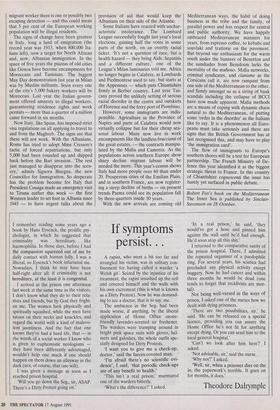If symptoms persist. . .
I remember reading some years ago a book by Hans Eysenck, the prolific psy- chologist, in which he suggested that criminality was hereditary, like haemophilia. In those days, before I had the compassion squeezed out of me by daily contact with human folly, I was a liberal, so Eysenck's book infuriated me. Nowadays, I think he may have been half-right after all: if criminality is not hereditary, at the least it is congenital.
I arrived at the prison one afternoon last week at the same time as the visitors. I don't know what they do to their rela- tives and friends, but by God they fright- en me. The women look physically and spiritually squashed, while the men have tatoos on their necks and knuckles, and regard the world with a kind of malevo- lent jauntiness. And the fact that one knows they've had a hard life, that — in the words of a social worker I know who is given to euphemistic neologisms — they have been differently advantaged, wouldn't help one much if one should happen on them down an alleyway in the dark (not, of course, that one will).
I was given a message as soon as I reached prison hospital.
`Will you go down the Seg., sir, ASAP. There's a Dirty Protest going on.' A rapist, who went a bit too far and strangled his victim, was in solitary con- finement for having called a warder `a Welsh git'. Seized by the injustice of his treatment, the rapist smashed up the cell and covered himself and the walls with his own excrement (this is what is known as a Dirty Protest). Now he was demand- ing to see a doctor, that is to say, me.
The ambience in the Seg. had been made worse, if anything, by the liberal application of Home Office ozone- friendly lavender-scented air freshener. The warders were tramping around in bright pink space suits with gloves, hel- mets and galoshes, the whole outfit spe- cially designed for Dirty Protests.
`I want you to give me a check-up, doctor,' said the faeces-covered man.
'I'm afraid there's no scientific evi- dence', I said, `that periodic check-ups are of any benefit to health.'
`This isn't a real prison,' murmured one of the warders bitterly.
`What's the difference?' I asked. 'In a real prison,' he said, `they would've got a hose and pinned him against the wall until he'd had enough. He'd soon stop all this shit.'
I returned to the comparative sanity of the prison hospital. There, I admitted the repeated organiser of a paedophile ring. For several years, his sciatica had precluded any physical activity except buggery. Now he had cancer and within three months he would be dead (one tends to forget that recidivists are mor- tal). Not being well-versed in the ways of prison, I asked one of the nurses how we dealt with dying prisoners.
`There are two possibilities, sir,' he said. `He can be released on a special licence, providing you can assure the Home Office he's not fit for anything except dying. Or you can send him to the local general hospital.'
'Can't we look after him here?' I asked.
'Not advisable, sir,' said the nurse. `Why not?' I asked.
`Well, sir, when a prisoner dies on the in, the paperwork's terrible. It goes on for months, it does.'
Theodore Dalrymple


















































 Previous page
Previous page